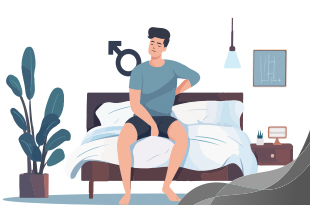How Testosterone Replacement Therapy Affects Male Fertility: What You Need to Know
Testosterone Replacement Therapy (TRT) has become a popular treatment for men experiencing low testosterone levels, also known as hypogonadism. While TRT offers significant benefits, such as improved energy, muscle mass, mood, and sexual function, it also raises a considerable concern for men who wish to preserve or enhance their fertility. The relationship between TRT and fertility is complex, and understanding how TRT affects sperm production and fertility is crucial for men considering this treatment.
In this blog, we will explore how testosterone replacement therapy interacts with fertility, why TRT is affecting fertility, does TRT affect fertility, how to maintain fertility on TRT, does TRT make you infertile, can testosterone affect fertility, and alternative treatments for men who want to boost their testosterone levels without compromising their fertility.
How Does Testosterone Replacement Therapy Impact Fertility?
Testosterone is a hormone produced primarily in the testes and plays a vital role in various male functions, including muscle development, bone density, mood regulation, and sexual health. It also directly impacts sperm production, a critical factor in male fertility.
READ MORE: Men’s Health Awareness: A Complete Guide
The production of testosterone and sperm is regulated by the hypothalamic-pituitary-gonadal (HPG) axis, a hormonal feedback loop involving the hypothalamus, pituitary gland, and testes. Here’s how it works:
- Hypothalamus: The hypothalamus releases gonadotropin-releasing hormone (GnRH), which is used when it detects low testosterone in the bloodstream.
- Pituitary Gland: In response to GnRH, the pituitary gland secretes two essential hormones: luteinizing hormone (LH) and follicle-stimulating hormone (FSH).
- Testes: LH prompts the manufacture of testosterone, while FSH triggers the production of sperm within the testes.
Such a delicate balance allows for maintaining reliable control over testosterone and sperm production within the body. This reveals the production of both testosterone and sperm increases naturally when the levels of testosterone decline. However, TRT can disrupt this delicate hormonal balance, leading to consequences for fertility.

How Does Testosterone Replacement Therapy Affect Fertility?
Even though testosterone is essential for the male reproductive system, using external testosterone via TRT will have adverse effects on spermatogenesis and, in general, productivity. This occurs because TRT can disrupt the normal functioning of the HPG axis.
When men take exogenous (externally provided) testosterone, their body senses that testosterone levels are sufficient or elevated. As a result, the hypothalamus reduces the release of GnRH, leading to lower levels of LH and FSH from the pituitary gland. The absence of these critical hormones sends a signal to the testes to down or entirely halt the production of sperm, a state of low or no sperm count that is classified as azoospermia. In some cases, TRT can reduce sperm counts significantly, even to zero, making it difficult or impossible for a man to conceive naturally.
Is TRT Permanent In Its Impact On Fertility?
TRT can either have temporary effects or cause changes that can last longer in your fertility. For example, men who choose to stop TRT tend to see a boost in sperm count once hormone levels are allowed to return to normal. Despite this, the duration it takes for fertility to start up again may be a different time. In some cases, sperm production could go back to normal in a couple of months; it could take a year or more in other cases. Some of the variables that may affect the rate of recovery include the patient’s age, the time of use of TRT, and other associated diseases.
In some situations, for men taking TRT for a long time or at a higher dosage, the outcome will be irreversible, and some will not be physically capable of fathering a child. Therefore, for men who are planning to have children in the near future, it’s essential to carefully weigh the risks of starting TRT against their reproductive goals.
READ MORE: Male Genital Diseases: Everything to Know
Alternatives to TRT for Men Wanting to Preserve Fertility
Fortunately, there are alternative treatment options for men who want to boost their testosterone levels without sacrificing their fertility. These options focus on stimulating the body’s natural production of testosterone rather than introducing external testosterone, which allows the HPG axis to continue functioning normally.
Here are some common alternatives:
-
Clomiphene Citrate (Clomid)
Clomiphene is an oral medication that works by stimulating the pituitary gland to pump out more energy in creating LH and FSH so as to raise the all-natural productivity of both testosterone and sperm. Unlike TRT, clomiphene does not reduce sperm count and hence can be used for men who desire to continue being fertile while managing their low testosterone.
How It Works: Clomiphene blocks estrogen receptors in the brain, preventing the feedback inhibition that would typically reduce testosterone production. This tricking of the body into increasing its natural testosterone production helps boost both testosterone and sperm counts.
-
Beta-human chorionic gonadotropin (β-hCG)
Another option is human chorionic gonadotropin (hCG) because this hormone can maintain male fertility while on testosterone. It is sometimes used with clomiphene or with TRT to preserve the potential for spermatogenesis.
How It Works: hCG acts directly on the testes to increase testosterone levels, hence balancing normal body functions without having the side of suppressing the secretion of the LH and FSH, thus preserving sperm.
-
Aromatase Inhibitors
Anastrozole and other aromatase inhibitors are used in treatment regimens since they discourage the transformation of testosterone into estrogen. Such drugs and medication lower the level of estrogen, leading to an increase of testosterone with no negative effect on fertility. However, they are commonly used where hormone levels have elevated estrogen levels that are causing low testosterone.
-
Lifestyle Changes
Sometimes, the levels of testosterone are influenced heavily by life choices. Small changes in the diet, exercise regime, sleep, and stress-reducing strategies can help increase testosterone levels in the body safely and without an impact on fertility. Drinking less alcohol, avoiding smoking, and shedding those extra pounds also remove hormonal imbalances and strengthen reproductive organs.
READ MORE: Testosterone Replacement Therapy Before and After: Is It That Effective?
Balancing Testosterone and Fertility: Personalized Care Is Key
Men interested in fertility must consult a healthcare provider before they commence any treatment with TRT. A fertility-friendly strategy would be to choose something different, such as clomiphene or hCG, to raise testosterone without impacting sperm generation. In certain situations, men may also decide to freeze sperm before coming to TRT treatment so as to have a future chance of reproduction.
In consultation with a physician who is a specialist in male fertility and hormone treatment, a tailored lifestyle plan enables a man to regain hormonal balance while maintaining fertility.
Can Men on TRT Have A Child?
Infertility may be minimized due to testosterone replacement therapy, but it does not eliminate fatherhood. Most males who use TRT are capable of making babies, provided they stop the treatment for some time to allow sperm production to be expected. Many men who are on TRT can father children by temporarily discontinuing therapy and allowing their natural sperm production to rebound. For those who experience permanent fertility issues, assisted reproductive technologies (ART), such as in vitro fertilization (IVF), can offer alternative paths to parenthood.
READ MORE: Can Diabetes Cause Erectile Dysfunction?
Conclusion
Low testosterone impacts erectile function and sexual desire, and testosterone replacement with erectile dysfunction treatment along with hormone replacement therapy, makes a positive difference. Hence, the possibility of fertility reduction must be taken into consideration. Before a man chooses to do TRT, he has to know that sperm production is affected by the treatment and then decide if the pros outweigh the cons, especially in case he intends to have children someday.
Fortunately, other forms of therapy have been developed in order to address issues related to traditional TRT, which includes clomiphene and hCG. In the case of males on TRT who desire to retain fertility, talking to a healthcare provider about fertility preservation is crucial. By understanding the options and discussing the situation with a specialist, men can choose a course of treatment that will be optimal for both hormone treatment and future childbearing. If you or any of your relatives are struggling with testosterone issues then now is the ideal time for you to get in touch with Revive Men’s Health and attain the benefits today!



